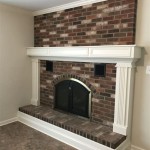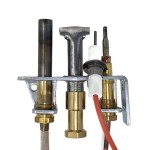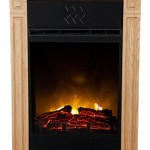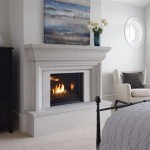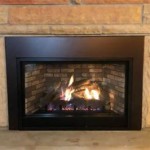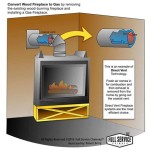Exploring the World of Old Gas Fireplace Inserts
Gas fireplace inserts offer a convenient and efficient way to enjoy the ambiance and warmth of a fireplace without the hassle and mess associated with traditional wood-burning fireplaces. While modern gas fireplace inserts boast advanced features and high efficiency ratings, older models, often referred to as "old gas fireplace inserts," present a unique set of considerations for homeowners. This article delves into the characteristics of old gas fireplace inserts, exploring their advantages, disadvantages, safety aspects, and potential for restoration or replacement.
An old gas fireplace insert typically refers to a model manufactured several years ago, predating recent advancements in gas fireplace technology. These inserts may be found in older homes or purchased second-hand. Understanding their specific attributes is crucial before deciding to install, use, or replace one.
Understanding the Characteristics of Old Gas Fireplace Inserts
Old gas fireplace inserts differ significantly from their modern counterparts in several key areas. These differences can impact performance, efficiency, and safety. It is essential to recognize these characteristics to make informed decisions regarding their use.
Firstly, efficiency is a crucial factor. Older models generally have lower Annual Fuel Utilization Efficiency (AFUE) ratings compared to newer inserts. This means a larger portion of the gas they burn is lost as heat through the venting system rather than being directly radiated into the room. Consequently, heating costs can be significantly higher with an older unit. The design of the burner and heat exchanger in older units often lacks the sophistication found in modern designs, further contributing to lower efficiency.
Secondly, safety features are less advanced in older models. Modern gas fireplace inserts are equipped with safety devices such as oxygen depletion sensors (ODS) and automatic shut-off mechanisms that prevent carbon monoxide poisoning and gas leaks. Older inserts may lack these crucial components, making regular maintenance and inspection even more critical. The pilot light system in older models may also be less reliable, potentially leading to nuisance outages and requiring frequent relighting.
Thirdly, aesthetics and design are often less refined. While some homeowners appreciate the vintage appearance of older inserts, many prefer the sleek and modern designs of newer models. Options for customization, such as log sets and decorative fronts, are typically limited for older inserts. The flame pattern may also be less realistic compared to the visually appealing flames produced by modern burner technology.
Finally, parts availability can be a significant challenge. As older models age, finding replacement parts becomes increasingly difficult. Manufacturers may discontinue production of components for older units, leaving homeowners to search for used parts or consider complete replacement. Even if parts are available, their cost may be disproportionately high compared to the value of the insert itself.
Advantages and Disadvantages of Retaining an Old Gas Fireplace Insert
Choosing to keep and operate an old gas fireplace insert involves weighing potential advantages against inherent disadvantages. A thorough evaluation is necessary to determine if retaining the unit is a practical and safe option.
One potential advantage is cost savings in the short term. If an existing old gas fireplace insert is already installed and functioning, avoiding the expense of purchasing and installing a new unit can be appealing. However, this initial cost savings may be offset by higher operating costs due to lower efficiency.
Another perceived advantage is the aesthetic appeal of certain vintage models. Some homeowners appreciate the classic design and charm of older inserts, which may complement the architectural style of their homes. This is a subjective factor, and the aesthetic appeal may not outweigh the other disadvantages.
However, the disadvantages are often more significant. As previously mentioned, lower efficiency translates to higher heating bills. The lack of advanced safety features poses a potential risk of carbon monoxide poisoning or gas leaks. The limited availability of replacement parts makes repairs difficult and costly. Furthermore, older inserts may not meet current safety and energy efficiency standards.
The environmental impact is also a consideration. Lower efficiency means increased consumption of natural gas, which contributes to greenhouse gas emissions. Replacing an old, inefficient insert with a newer, more efficient model can significantly reduce a homeowner's carbon footprint.
Therefore, while retaining an old gas fireplace insert may seem appealing in some cases, the potential disadvantages related to safety, efficiency, and maintenance often outweigh the perceived advantages.
Safety Inspection and Maintenance of Old Gas Fireplace Inserts
Given the inherent safety concerns associated with old gas fireplace inserts, regular inspection and maintenance are paramount. A qualified technician should perform a thorough inspection at least once a year, preferably before the heating season begins. This inspection should include the following:
First, a check for gas leaks. Gas leaks can be hazardous and potentially lead to explosions or carbon monoxide poisoning. The technician should use a gas leak detector to check all connections, including the gas line, valve, and burner assembly. Any leaks should be repaired immediately.
Second, inspection of the venting system. The venting system is responsible for safely removing combustion gases from the home. The technician should check the vent pipes for blockages, corrosion, or damage. Any obstructions should be removed, and damaged vent pipes should be replaced.
Third, burner and pilot light cleaning. The burner and pilot light can become clogged with dust and debris, which can affect their performance and efficiency. The technician should clean these components to ensure proper operation. The pilot light should be adjusted to the correct flame height.
Fourth, carbon monoxide testing. Even with regular maintenance, it is essential to have a working carbon monoxide detector installed in the home. The technician should test the detector to ensure it is functioning correctly. Homeowners should also regularly test their carbon monoxide detectors themselves.
Fifth, check the oxygen depletion sensor (ODS). If the old gas fireplace insert has an ODS, the technician should test its functionality. The ODS shuts off the gas supply if the oxygen level in the room drops below a certain threshold, preventing carbon monoxide buildup.
Homeowners should also perform basic maintenance tasks themselves, such as cleaning the glass front of the insert and visually inspecting the unit for any signs of damage or wear. If any problems are suspected, a qualified technician should be contacted immediately.
Ignoring regular inspection and maintenance can significantly increase the risk of safety hazards and reduce the lifespan of the old gas fireplace insert.
Restoration vs. Replacement of Old Gas Fireplace Inserts
When facing issues with an old gas fireplace insert, homeowners often consider two primary options: restoration or replacement. The decision hinges on several factors, including the age and condition of the insert, the availability of replacement parts, the cost of repairs, and the desired level of performance and efficiency.
Restoration may be a viable option if the insert is in relatively good condition and the necessary replacement parts are readily available. Restoration typically involves cleaning, repairing, or replacing damaged components, such as the burner, valve, or venting system. The goal is to restore the insert to its original operating condition.
However, even with restoration, the insert will likely still lack the advanced safety features and high efficiency of modern models. Furthermore, the cost of restoration can be significant, especially if major components need to be replaced. It's paramount to obtain a comprehensive estimate from a qualified technician before proceeding with restoration to accurately assess the total cost. The labor costs associated with disassembly, cleaning, and reassembly can also contribute significantly to the overall expense.
Replacement, on the other hand, involves removing the old insert and installing a new, modern gas fireplace insert. While this option requires a larger initial investment, it offers several long-term benefits. Modern inserts are significantly more energy-efficient, resulting in lower heating bills. They also incorporate advanced safety features, providing greater peace of mind. The improved aesthetics and design options of newer models can also enhance the overall look and feel of the living space.
When considering replacement, it's crucial to choose a model that is appropriately sized for the fireplace opening and meets the heating needs of the room. A qualified installer can help with selecting the right insert and ensuring proper installation, which is essential for safety and efficiency.
Ultimately, the decision to restore or replace an old gas fireplace insert depends on individual circumstances and priorities. If safety and efficiency are paramount, replacement is generally the preferred option. If cost is the primary concern and the insert is in relatively good condition, restoration may be a viable alternative, but only after careful consideration of the potential drawbacks.
In conclusion, navigating the world of old gas fireplace inserts requires a comprehensive understanding of their characteristics, safety aspects, and potential for restoration or replacement. By carefully evaluating these factors, homeowners can make informed decisions that ensure the safe and efficient operation of their fireplaces.

Belmont Small Gas Insert

Advantages Of Gas Fireplace Inserts Napolis In

Vanguard Converts Your Old Wood Burning Fireplace Into An Efficient Vent Free

Gas Inserts Victorian Fireplace

Gas Inserts For The Old Fireplaces San Francisco Victorian Restoration

Gas Fire Antique Fireplace Co

Belmont Small Gas Insert

Belmont Small Gas Insert Old Fireplace

Gas Fireplace Inserts Pros And Cons Of Ventless Fireplaces

Gas Fireplace Inserts Fireplacesdirect Com

